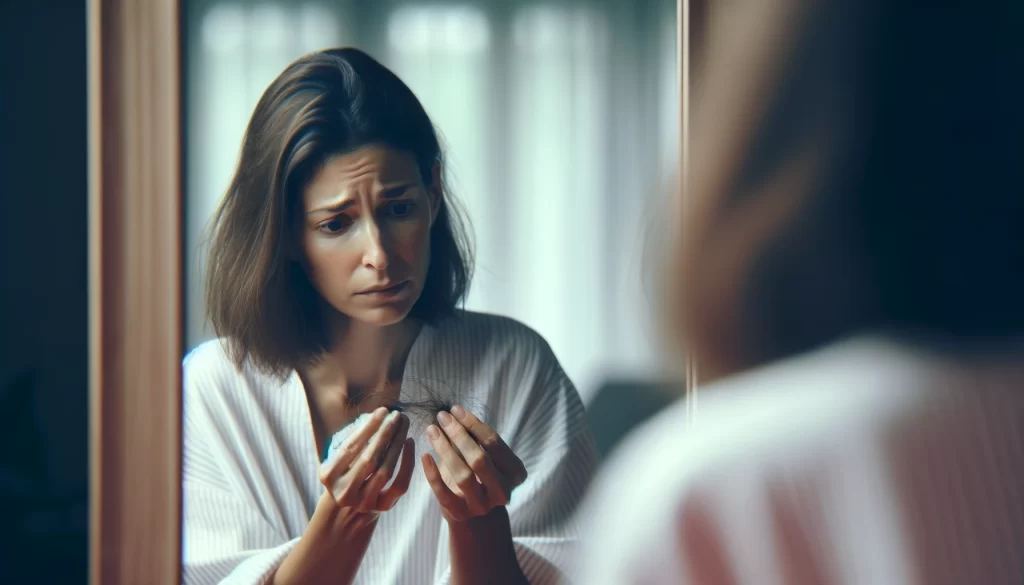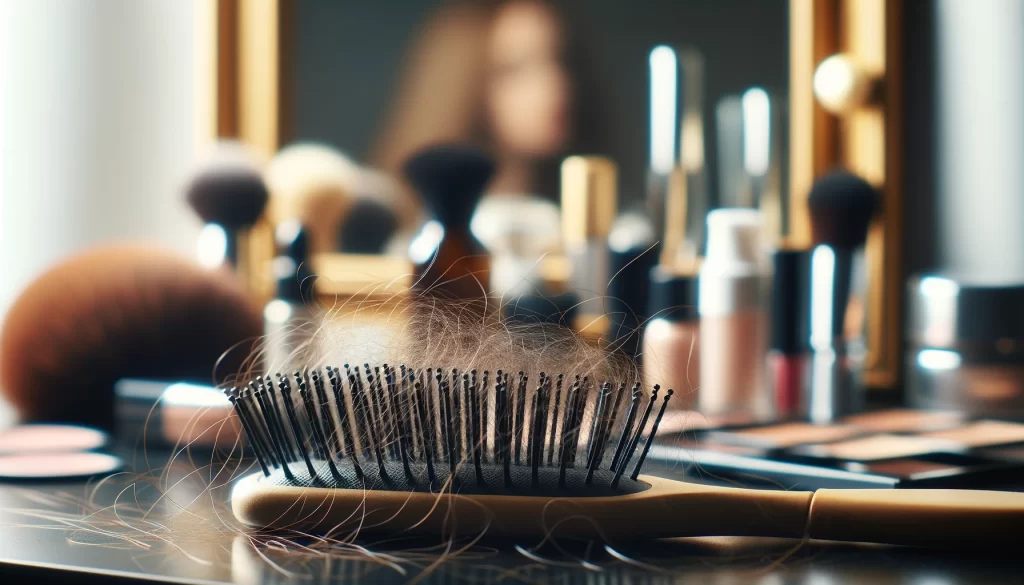Understanding Lupus and Hair Loss: Causes & Care
 January 24, 2024 | Lupus
January 24, 2024 | Lupus
Understanding Lupus and Hair Loss: Causes & Care
As someone navigating the unpredictable waters of an autoimmune disease, I’m all too familiar with the distressing symptom of hair loss that comes with lupus, a chronic condition known medically as systemic lupus erythematosus. Countless others who are also grappling with lupus can attest to the emotional toll it takes—witnessing the transformation of healthy hair follicles into weakened echoes of their former selves. For many, lupus symptoms include hair loss, ranging from slight thinning to stark baldness, casting a veil of uncertainty and concern over each day.

My journey and conversations with healthcare professionals have highlighted that while not every lupus warrior will experience hair loss, for those who do, it tends to dig deeply into one’s self-image and confidence. The complexity of lupus hair loss is evident; it’s not solely about appearance but a sign of the underlying inflammation assaulting the body, revealing the harsh reality that lupus is much more than skin deep.
Key Takeaways
- Understanding lupus and hair loss involves recognizing the connection between systemic lupus erythematosus and the health of hair follicles.
- Hair loss in lupus can manifest as thinning, full baldness, or loss of hair in regions such as eyebrows and lashes.
- Different types of lupus-related hair loss include scarring and non-scarring, which have distinct impacts and treatment approaches.
- Inflammation is a common thread between lupus symptoms and hair loss, often prompting this unwelcome change.
- Medications used to treat lupus may contribute to hair loss, adding complexity to the management of this autoimmune disease.
- Awareness and early intervention can play significant roles in addressing lupus hair loss and improving quality of life for sufferers.
Table of Contents
- Exploring the Connection Between Lupus and Hair Loss
- The Impact of Inflammation on Hair Follicles in Lupus Patients
- Lupus Symptoms Hair Loss and Treatment Options
- Strategies for Managing Hair Loss Due to Lupus
- Conclusion
- Frequently Asked Questions
- Source Links
Exploring the Connection Between Lupus and Hair Loss
Understanding the pervasiveness of lupus-related hair loss is crucial for individuals grappling with systemic lupus erythematosus (SLE). This autoimmune condition not only wreaks havoc on multiple body systems but also often results in hair loss—a deeply personal and visible affliction. Although not all lupus patients will experience hair loss in lupus, for many, it is an indisputable reality.
Lupus can induce a decline in hair quality, leading to lupus and hair thinning, as well as intensify the rate at which hair sheds. This might manifest subtly with hairs found on the pillow in the morning, or dramatically with clumps of hair disappearing with each brush stroke. Whether it’s a receding hairline or patchy spots, the journey from full hair to experiencing lupus and baldness is often fraught with emotional distress.
Inflammation is the menacing culprit behind hair loss in lupus, targeting the hair follicles with an unyielding ferocity that can range from temporary to permanent damage.
Often, lupus patients hold onto hope as non-scarring hair loss keeps the possibility of future hair regrowth alive following effective treatment. However, the prospect dims considerably when scarring hair loss enters the scene, leaving its indelible mark with scarred follicles that staunch the flow of new hair.

It’s essential to discern between these two forms of hair loss—the reversible and the irreversible—as the therapeutic approach may differ significantly, impacting both physical appearance and psychological wellbeing. Below is an overview showcasing the differences between non-scarring and scarring hair loss in lupus patients:
| Type of Lupus Hair Loss | Characteristics | Potential for Regrowth | Common Patient Experience |
|---|---|---|---|
| Non-Scarring Hair Loss | Hair thinning and increased shedding without permanent follicle damage | High, with appropriate lupus management and remission | Hairline recession, diffuse thinning |
| Scarring Hair Loss | Irreversible damage to hair follicles due to discoid lesions and scarring | None, scarring prevents regrowth | Bald patches, permanent hair loss |
Lupus doesn’t tread lightly when it comes to hair, affecting not just the scalp but potentially extending to eyebrows, and, in some cases, even the eyelashes. For individuals with SLE, it’s about managing expectations and knowing the treatment landscape that will pave the way for the best possible outcome when dealing with lupus-related hair loss.
The Impact of Inflammation on Hair Follicles in Lupus Patients
Lupus is a multifaceted disease that can have varying implications for individuals dealing with its effects. Of the multitude of symptoms it presents, one of the more distressing for many is hair loss. Understanding the underlying reasons for hair loss in lupus, particularly focusing on the role of inflammation, can help in identifying coping strategies and treatment options.
Understanding Non-Scarring Versus Scarring Hair Loss
Hair loss causes in lupus often pivots around the form of hair loss—non-scarring or scarring. With non-scarring hair loss, lupus patients may notice a thinning of the hair without any permanent damage to the hair follicles, allowing for the possibility of hair regrowth if the underlying inflammation caused by lupus is effectively treated and controlled. This type of hair loss is often observed during a lupus flare but may be reversed with the remission of the flare.
In contrast, scarring hair loss is a more severe consequence, often a result of discoid lupus erythematosus. This type of hair loss can be attributed to the formation of lesions that leave scars behind, thus leading to permanent hair loss. Due to this, being proactive in treatment plans is essential to minimize the extent of the damage.

Discoid Lesions and Their Role in Hair Loss in Lupus
The development of discoid lesions is a common issue within discoid lupus erythematosus and represents a significant hair loss causes in lupus. These lesions can be particularly aggressive, often leading to permanent hair loss due to severe damage to the hair follicles. Their appearance is usually characterized by round, scaly patches on the scalp that can scar, thus exacerbating hair loss.
How Inflammation from Lupus Affects the Scalp and Hair
The chronic inflammation caused by lupus can precipitate a host of problems for the scalp and hair. When the hair follicles become inflamed, the resulting environment can disrupt the natural hair growth cycle, leading to hair weakening, thinning, and eventually falling out. This can be especially pronounced during periods of a lupus flare, where inflammation can be more intense and widespread.
Effective management of lupus, therefore, involves both controlling the inflammation and committing to therapy that targets the health of the scalp and hair follicles. In this way, despite the challenges posed by this autoimmune condition, one can strive to mitigate the distressing symptom of hair loss.
Lupus Symptoms Hair Loss and Treatment Options
When it comes to lupus hair loss treatment, the approach can significantly differ depending on whether the hair loss is reversible or not. Reversible hair loss is generally treated by reducing lupus activity, which can lead to lupus hair regrowth. To treat lupus and encourage hair growth, a combination of medications and lifestyle changes are recommended.
Medications such as corticosteroids and antimalarials are prescribed to manage inflammation, one of the primary causes of hair loss in lupus patients.
Immunosuppressants and biologics are also part of treatment options aimed at controlling lupus flares that contribute to hair loss. Meanwhile, lifestyle modifications such as avoiding sun exposure can prevent discoid lesions that often lead to scarring and irreversible hair loss. For those dealing with medication-induced hair loss, a consultation with a healthcare provider is essential to consider dosage adjustments or alternative therapies.
For irreversible hair loss, resulting from scarring lesions, patients may explore cosmetic interventions:
- Hair transplantation
- Surgical scar revision
- Use of wigs or hairpieces to conceal hair loss
Understanding your specific lupus-related hair loss symptoms is crucial in identifying the best treatment plan. Below is a comprehensive overview of potential treatments for lupus-induced hair loss:
| Treatment Type | Purpose | Outcome Expectation |
|---|---|---|
| Medicinal (Corticosteroids, antimalarials) | To reduce inflammation and suppress the immune system | May lead to hair regrowth upon lupus remission |
| Lifestyle Adjustments (Sun Protection) | To prevent triggering lupus flares and lesions | Possibly prevents further hair loss or damage |
| Medication Adjustment | To minimize side effects of lupus treatment | Can alleviate hair loss caused by drug side effects |
| Cosmetic Procedures | For cases of permanent, scarring hair loss | Improvement of appearance and cover-up of hair loss areas |
I hope this guidance on treatment options offers a clearer path for those struggling with hair loss due to lupus. Your journey towards healing and managing lupus symptoms, including hair loss, can be hopeful with the right treatment plan and support.
Strategies for Managing Hair Loss Due to Lupus
As I navigate the challenges of living with lupus, I have found several effective strategies to cope with hair loss, a common concern for many like me. Understanding that each person’s journey is unique, incorporating personalized hair loss treatments and hair care modifications can lead to better management of this condition.
Protecting the Scalp from Sun Exposure and Flares
Minimizing sun exposure is crucial to safeguarding my scalp and minimizing hair loss from lupus flares. Wearing a wide-brimmed hat and using SPF-formulated products designed for the scalp are part of my daily routine to provide an additional layer of protection against UV rays.
The Role of Diet and Supplements in Promoting Hair Regrowth
The connection between diet and hair loss in lupus cannot be overstated. I focus on a nutrient-rich diet, emphasizing foods that are high in biotin, vitamin C, iron, and zinc to support hair strength and foster regrowth.
Adjusting Hair Care Routines to Minimize Breakage
- Switching to silk or satin pillowcases to reduce friction and thereby hair breakage while sleeping.
- Reducing the frequency of hair washes to prevent further drying and weakening of the hair.
- Eliminating the use of harsh chemical treatments or heat styling tools that can exacerbate hair loss.
Lupus Medication Adjustments to Alleviate Hair Loss Symptoms
In discussions with my healthcare provider, we’ve explored the possibility of adjusting my lupus medications which might contribute to hair loss. Finding the right balance between managing lupus and preserving hair health is a delicate process, but with the right treatment plan, it’s achievable.
| Nutrient | Benefits | Food Sources |
|---|---|---|
| Biotin | Promotes keratin production | Eggs, nuts, whole grains |
| Vitamin C | Antioxidant, supports collagen | Citrus fruits, strawberries, bell peppers |
| Iron | Essential for hair growth | Leafy greens, red meat, beans |
| Zinc | Aids hair follicle health | Shellfish, legumes, seeds |
Conclusion
Living with lupus, a condition with a spectrum of manifestations including systemic lupus erythematosus and chronic cutaneous lupus, presents its unique set of challenges, among which hair loss is a notable concern for many. My ongoing journey with lupus has underscored the importance of proactive management, not only to alleviate the core symptoms of the disease but also to address the demoralizing consequence of hair loss. While it’s clear that early and targeted treatment can significantly reduce the severity of hair loss, especially from discoid lesions, there’s no one-size-fits-all solution to completely prevent it.
The very nature of the connection between lupus and hair loss conveys a vital message: the significance of individualized care strategies. Nonscarring hair loss, in my experience, has offered a beacon of hope for reversal, ensuring that with proper management of my lupus, there’s a chance for my hair to regain its former vitality. Conversely, I’ve come to terms with the reality that scarring hair loss signifies a permanent change—one that requires emotional resilience and adaptability.
Hair loss prevention in lupus involves a multifaceted approach, combining medical treatment with mindful hair care and lifestyle choices. I’ve learned that each action, from embracing gentle hair care routines to optimizing my diet and reducing stress, plays a critical role in managing lupus. Above all, the journey has taught me the value of embracing support and resources available to those affected by lupus, empowering us to navigate this chronic condition with dignity and strength.
Frequently Asked Questions
What causes hair loss in individuals with lupus?
Hair loss in individuals with lupus can be caused by the disease itself, as an autoimmune response affects hair follicles leading to non-scarring or scarring hair loss. Inflammation around hair follicles, particularly during a lupus flare, can result in hair thinning and loss. Additionally, certain lupus medications, particularly immunosuppressants and corticosteroids, can contribute to hair loss.
Is hair loss from lupus permanent?
The permanence of hair loss from lupus depends on the type of hair loss experienced. Non-scarring hair loss may be reversible and hair might regrow once lupus is treated effectively and the inflammation subsides. However, scarring hair loss, often resulting from discoid lesions, can lead to permanent hair loss due to irreparable damage to hair follicles.
Can lupus hair loss be treated?
Yes, there are treatment options for hair loss due to lupus. Addressing the underlying lupus activity with medications like corticosteroids, antimalarials, and immunosuppressants can help to reduce symptoms, including hair loss. In cases of medication-induced hair loss, treatment may involve adjusting dosages or switching medications, under the guidance of a healthcare provider.
How can I minimize hair loss from lupus?
Minimizing hair loss from lupus involves managing the disease with appropriate treatment to reduce inflammation and prevent flares. Protecting the scalp from sun exposure, maintaining a nutrient-rich diet, and taking special care with hair routines can also help reduce hair loss. Adjusting medications that contribute to hair loss may be necessary, in consultation with your healthcare provider.
Are there strategies to cope with hair thinning and baldness caused by lupus?
Certainly. To cope with hair thinning and baldness, you can protect your scalp from sun exposure, use gentle hair care products, try hairstyles that minimize stress on your hair, and consider wearing hats, scarves, or wigs for protection and comfort. Additionally, exploring options such as cosmetic procedures might be beneficial for some individuals.
What role does diet play in hair regrowth for lupus patients?
Diet plays a significant role in overall health, including hair regrowth for lupus patients. Consuming a balanced diet rich in vitamins and minerals, particularly those like biotin, vitamin C, iron, and zinc, can support hair strength and growth. It’s important to consult a nutritionist or healthcare provider to tailor a diet plan that suits your needs.
Can changing my hair care routine help with lupus-related hair loss?
Yes, altering your hair care routine can be beneficial in managing lupus-related hair loss. Gentle handling of your hair, reducing the frequency of washing, avoiding harsh chemical treatments, minimizing heat styling, and using soft pillowcases can all help reduce breakage and promote healthier hair.
Should people with lupus avoid certain hair treatments?
People with lupus should exercise caution with hair treatments, especially those that involve chemicals or heat that may damage the hair and scalp. It’s advisable to consult with a dermatologist or hair care specialist to determine safe options, focusing on gentle and non-damaging treatments.
What should I do if I suspect my medication is causing hair loss?
If you suspect that your medication is causing hair loss, it’s important to talk with your healthcare provider before making any changes. They can review your medication regimen and may suggest adjustments or alternative treatments that might lessen hair loss without compromising your lupus management.
How can I manage the stress of hair loss due to lupus?
Managing the stress of hair loss due to lupus can include seeking support from therapists, support groups, or connecting with others who have lupus. Engage in stress-reducing activities like yoga, meditation, or exercise, and remember that focusing on effective lupus management can also improve hair health over time.
Source Links
- https://www.healthline.com/health/lupus/hair-loss
- https://www.lupus.org/resources/hair-loss-and-lupus
- https://www.medicalnewstoday.com/articles/lupus-hair-loss-treatment
ABOUT

Hey there! I'm Angela,
I am a survivor of cancer, lupus, fibromyalgia, and a teenage daughter. Join me as I document my experiences and educate the world on my chronic illness journey.


